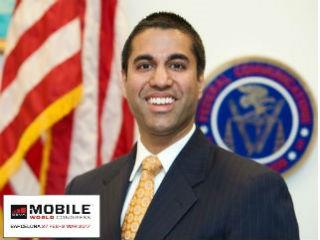Barely five weeks into his new role as chairman of the US Federal Communications Commission (FCC), the Republican Ajit Pai, criticised the regulatorily approach to broadband by his predecessor, the Democrat Tom Wheeler

Without mention it by name, the fresh FCC chairman pointed clearly to the regulation fever of the Obama era. Policies set out in the 1990s and early 2000s -light touch regulation, encouraging facilities-based competition, free use policies (where operators can decide which technologies to use in licensed bands) and freeing up more spectrum for mobile use- had produced ‘impressive results’. ‘The private sector has spent $1.5 trillion since 1996 to deploy broadband infrastructure and consumers have also reaped awards’, said Pai. ‘Ninety-eight percent of consumers have access to three or more facilities-based access providers, and the US leads the world in 4G’.
by
N. Peter Kramer*
In his keynote speech, Ajit Pai told the audience in the ‘5G Economy’ session of WMC 2017 that the US would now be better placed to attract private investment for broadband and 5G by ditching previous FCC policies. He also said that he came to Europe as a friend and not as a competitor. ‘We have to cooperate’.
‘The torch at the FCC has been passed to a new generation, dedicated to renewal as well as change’, he said. ‘We are on track to returning to a successful approach through light-touch regulation’. In a ‘polite’ attack on Wheeler, Pai said it was ‘evident that the FCC made a mistake ‘two years ago’. That was when the FCC passed the Open Internet Order, designed to ensure net neutrality -the principle that all web traffic should be treated equally- and reclassified broadband internet access as a telecommunications service under Tittle II of the US Communications Act from 1934!
Pai claimed that mobile operators and consumers in the US are already seeing the benefits of a more deregulatory approach. One of his first decisions as FCC chairman was to abandon the agency’s investigation into whether the ‘zero-rated’ (free data) plans of AT&T Mobility, Verizon Wireless and T-Mobile US were anti-competitive or not. ‘The truth is, customers love getting something for free and want service providers to compete. Our decision to stop the investigation was done out of respect for those preferences’, said Pai.
Without mention it by name, the fresh FCC chairman pointed clearly to the regulation fever of the Obama era. Policies set out in the 1990s and early 2000s -light touch regulation, encouraging facilities-based competition, free use policies (where operators can decide which technologies to use in licensed bands) and freeing up more spectrum for mobile use- had produced ‘impressive results’. ‘The private sector has spent $1.5 trillion since 1996 to deploy broadband infrastructure and consumers have also reaped awards’, said Pai. ‘Ninety-eight percent of consumers have access to three or more facilities-based access providers, and the US leads the world in 4G’.
‘We would not have seen such innovation if, during the 1990s and early 2000s, the government had treated broadband like a railway or a water utility’, he said. At the end of his keynote speech he told his audience that all four nationwide mobile network operators either launched new unlimited data plans or modified existing ones following the decision to scrap the zero-rating enquiry. Another boon for consumers.
*Mr. Kramer is a special guest at the Mobile World Congress of Huawei Technologies.
EBR’s Editor-in-chief N. Peter Kramer is among the 100.000 visitors from 200 countries to MWC 2017. The annual Mobile World Congress in Barcelona is the largest gathering of the mobile industry in the world. This article is part of a series included in EBR's special report "WMC 2017 - The Next Element"






